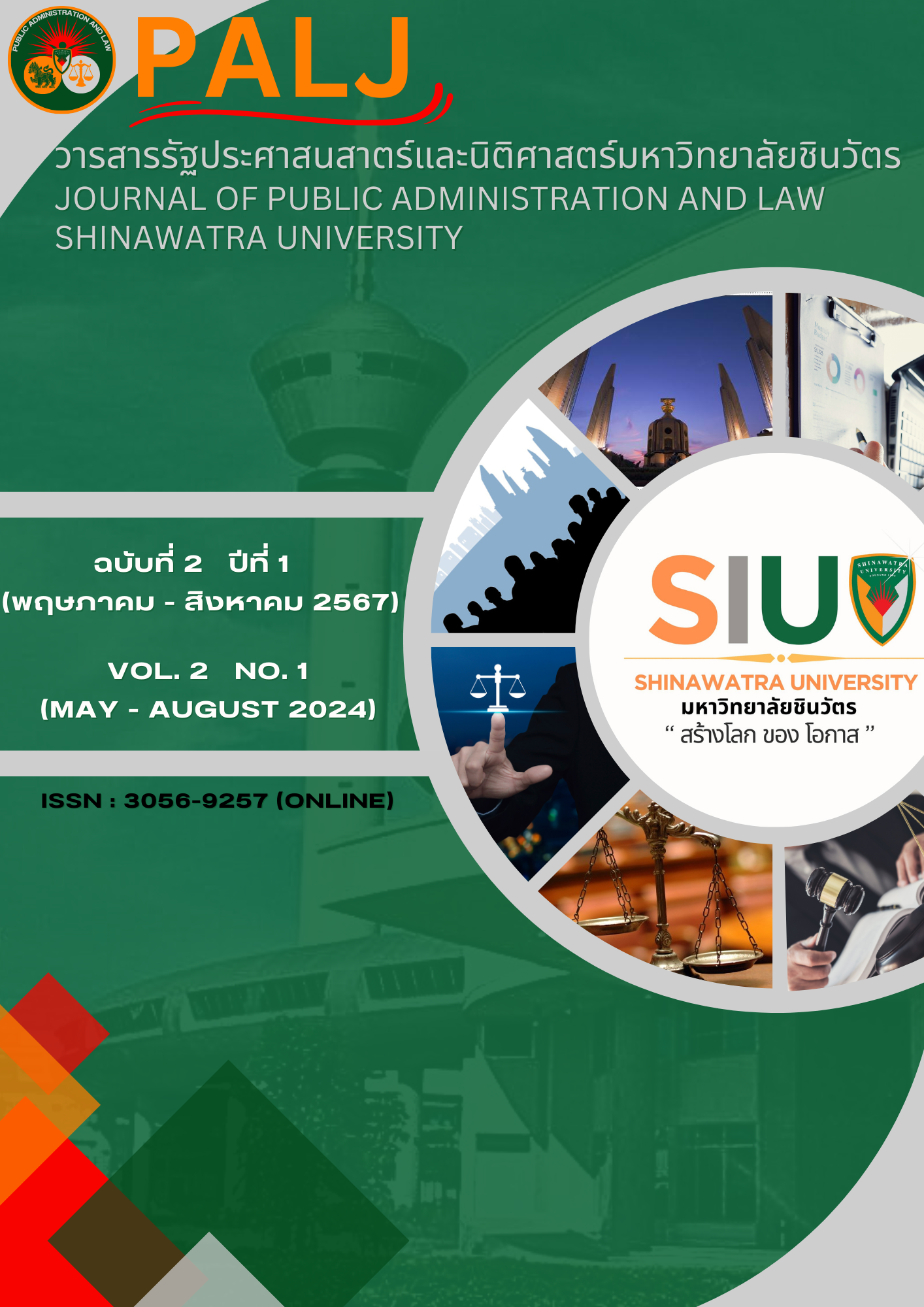THE PROCESS OF BALANCING NATURAL RESOURCES AND THE ENVIRONMENT ON THE BASIS OF THE EASTERN ECONOMIC CORRIDOR
Keywords:
natural resources and the environment, Eastern Economic Corridor, Chonburi provinceAbstract
This article aims to study the process of balancing natural resources and the environment based on the economic development platform in the eastern region of Thailand, particularly in Chonburi province. It employs mixed-method research, utilizing a sample group consisting of 400 residents of Chonburi province and 19 key informants and focus group discussion participants. Questionnaires and interviews were used as research tools. Data were analyzed using frequency, percentage, mean, standard deviation, and content analysis methods. The study findings reveal that: 1) The overall condition of the process of balancing natural resources and the environment is at the highest level, considering aspects such as process coherence, oversight, conflict management mechanisms, resource management, user perception and rights, outcomes of resource management, regulations and resource management, and the clarity of boundaries. 2) Problems encountered in the process include mainly conflicts related to rights in four categories: rights to access resources, rights to benefit from resource systems, rights in natural resource management, and rights conflict in resource access and lending. Violations of unauthorized rights were also identified. 3) Recommendations for the development of the process include studying and investigating problems and their causes, collectively devising and creating models and methods for problem-solving, participating in policy formulation or plans, decision-making on resource use, organizing or improving management systems, investing in environmental activities, adhering to environmental policies, and participating in monitoring, evaluation, and maintenance of projects.
References
กระทรวงทรัพยากรธรรมชาติและสิ่งแวดล้อม. (2562). แผนสิ่งแวดล้อมในพื้นที่เขตพัฒนาพิเศษภาคตะวันออก พ.ศ.2561-2564. กรุงเทพมหานคร : กระทรวงทรัพยากรธรรมชาติและสิ่งแวดล้อม.
กฤติน จันทร์สนธิมา และอรทัย อินต๊ะไชยวงค์. (2559). การมีส่วนร่วมในการจัดการทรัพยากรธรรมชาติอย่างสมดุลและยั่งยืน : ศึกษาเฉพาะกรณี ป่าชุมชน บ้านคลองห้วยหวายอำเภอแม่เปิน จังหวัดนครสวรรค์. วารสารสำนักงานผู้ตรวจการแผ่นดิน, 9(1), 58-79.
คณะกรรมการยุทธศาสตร์ชาติ. (2561). ยุทธศาสตร์ชาติ พ.ศ. 2561-2580 (ฉบับย่อ). กรุงเทพมหานคร : สำนักงานคณะกรรมการพัฒนาการเศรษฐกิจและสังคมแห่งชาติ.
ชล บุนนาค. (2555). แนวคิดว่าด้วยการจัดการทรัพยากรร่วม ประสบการณ์จากต่างประเทศและแนวคิด ในประเทศไทย. กรุงเทพมหานคร: เครือข่ายวิชาการเพื่อการปฏิรูป คณะกรรมการสมัชชาปฏิรูป.
ไพรัตน์ เดชะรินทร์. (2525). ทบทวนการพัฒนาชนบทไทย. กรุงเทพมหานคร: โรงพิมพ์ดีแอนด์เอส.
อารตี อยุทธคร, (2564). ระเบียงเศรษฐกิจพิเศษภาคตะวันออกและเครือข่ายทุนจีนข้ามชาติ, รายงานการวิจัยฉบับสมบูรณ์, กรุงเทพมหานคร : สำนักงานการวิจัยแห่งชาติ.
บุญชม ศรีสะอาด. (2544). การวิจัยเบื้องต้น. พิมพ์ครั้งที่ 9. กรุงเทพมหานคร : บริษัท สุวีริยาสาส์น จำกัด.
ปาริชาติ อินสว่าง อนุวัตร จินตกสิกรรม และเอกชัย ระดาพัฒน์. (2560). สภาพปัญหาข้อจำกัดในปัจจุบันและทิศทางแนวโน้มในอนาคตของการบริหารจัดการที่ดินและทรัพยากรดินของประเทศไทย. สำนักงานกองทุนสนับสนุนการวิจัย (สกว.).กรุงเทพมหานคร.
เพ็ญนภา สวนทอง. (2561). การศึกษาการจัดการทรัพยากรธรรมชาติและสิ่งแวดล้อม : มุมมองเศรษฐศาสตร์การเมือง. วารสารเศรษฐศาสตร์การเมืองบูรพา, 5(2). 95-118.
Ostrom Elinor. (1990). Governing the commons: The Evolution of Institutions for Collective Action. UK: Cambridge University Press.
Moustakas, C. (1994). Phenomenological Research Methods. Thousand Oaks, CA: Sage.
Yamane, Taro.(1967). Statistics, An Introductory Analysis, 2nd Ed., New York : Harper and Row.






